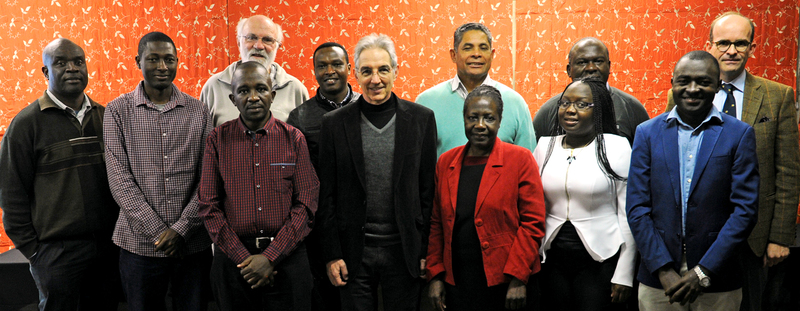Young African scholars toasted
12 July 2017 | Story Yusuf Omar. Photo Michael Hammond.
A group of young academics were feted at an All Africa House Fellowship Programme (AAHFP) workshop at UCT on 12 June.
The AAHFP was the brainchild of Professor Chuma Himonga, who launched it in 2009 with a view to attracting young or mid-career academics from universities in Africa, but outside South Africa. The fellows spend three months at UCT, living in All Africa House. Once here, they focus on developing their teaching materials and writing up completed research for publication, under the guidance of a mentor from UCT.
The fellowship’s main aim is to build capacity for research and teaching for universities in Africa and to foster collaboration between academics at UCT and across the continent. Seventeen journal articles and book chapters have been published between the 29 fellows who have joined the programme so far, Himonga was happy to report.
The fellows’ research has spanned everything from investigating the well-being of Kenya’s dragonflies (which, as UCT’s animal demography guru Professor Les Underhill pointed out, are the living litmus tests for fresh water systems’ cleanliness), to the challenges of implementing East African community law.
“A number of research collaborations are being forged between academic hosts, the fellows and the fellows’ home institutions,” Himonga said.
“This led to the establishment of a study and research centre, co-supervision of students registered at UCT, joint applications for collaboration grants, co-convening panels for big conferences, research consortiums including institutions other than those of the hosts and fellows, development of new courses in their disciplines and formation of networks for promoting interaction and exchange of knowledge among young African researchers.”
An Afropolitan University
Vice-Chancellor Dr Max Price, whose official strategic fund made the AAHFP possible, remarked that the AAHFP is one of the projects that has captured the idea of UCT “becoming an Afropolitan university”.
“We were a university which, for many decades, was isolated from the continent for reasons of academic boycott and politics, and for the period immediately after 1994, and for the period after 1994, our tendency was to re-establish the links with the traditional partnerships that we have had.
“Those were the easy links. So it was with the European, American, Canadian, Australian universities, and that was because many of our academics who were around in the 1990s and early 2000s were people who had done their university studies elsewhere in the world and obviously almost none of them had done their PhDs elsewhere in Africa.
“So the natural links and the places they went and the places where they had partnerships were in the global north.”
It was thus important for the university to figure out how to “turn our face” towards the African continent, said Price, “both to balance our partnerships so we would not just be an outpost of Europe on the tip of Africa”, but also so that UCT would become more integrated into the continent.
This is where the AAHFP came in.
Another reason for its importance lay in its value in giving UCT a “unique” feature compared to other “world-class research universities”, said Price.
“We aspire to be knowledgeable about the continent, to have significant expertise – perhaps to have more expertise collected in one place about the continent than anyone else in particular areas – in law, in environmental studies, in infectious diseases, in ecological studies, in minerology,” he said.
To be the destination of choice for knowledge about Africa, UCT needed to have real links and real knowledge, so one of the early strategies was to develop PhD programmes for students from around the continent. The USHEPiA project was one of the major programmes in that regard, said Price.
“This was, in some way, an extension of that,” said Price.
 This work is licensed under a Creative Commons Attribution-NoDerivatives 4.0 International License.
This work is licensed under a Creative Commons Attribution-NoDerivatives 4.0 International License.
Please view the republishing articles page for more information.










